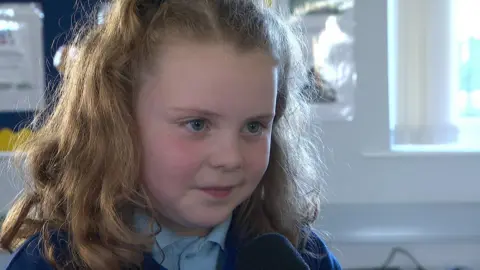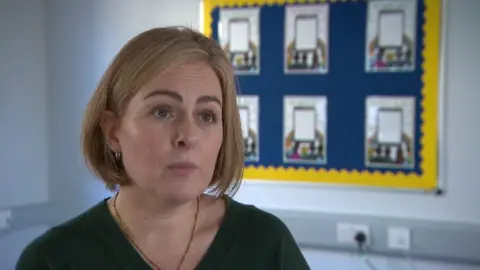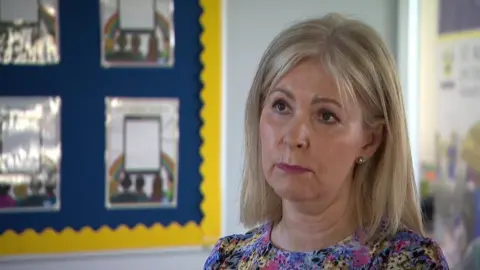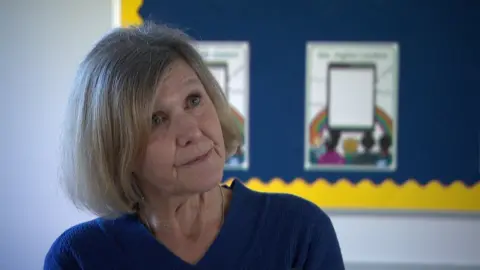School cuts: Pupils getting helping hand from retired volunteers
 BBC
BBC"It's been really good - before I started the course I felt in the middle, now I'm able to read bigger words."
Eight-year-old Rose McLaughlin-Donnelly has been getting extra help with her reading at school - but it's help with a difference.
Like many schools, St Mary's on the Hill in Glengormley, which Rose attends, has been facing pressure on its budget.
So the school has availed of the help of a group of retired professionals who volunteer their time to assist pupils with numeracy and literacy.
The retirees volunteer through a programme called Back on Track.
Barbara Niblock, the vice principal of the school, said that budget cuts have been severe.

"We did have dedicated funding for a number of targeted programmes post-Covid, but that funding has been pulled.
"So it really has been quite a task for the management of the school to ensure that the funding is put into the correct places to deal with the needs of the children," she said.
The Department of Education said it is extremely conscious of the severe pressures on school budgets and the serious challenges facing the education system, highlighted by the current funding gap of about £300m in 2023-24.
The Back on Track programme started in 2010 and is organised by the charity Solas.
It facilitates a process of early intervention and support to children in mainstream education who are not receiving statutory support.
Its organiser Kate Diamond said that due to the backdrop of Covid-19 and budget cuts, demand for additional voluntary support has never been higher.

"These are the kind of children that could potentially slip through the net but with that little bit of extra support from the volunteers that won't happen.
"Most of the volunteers are retired teachers but we now have civil servants, social workers - people that would have worked in the bank," she said.
Dr Colette Gray, a retired lecturer and developmental psychologist, volunteers with the programme.
She said research she had conducted as a lecturer highlighted that many children were not doing as well in literacy as they should.
"That meant they were going to post-primary school not equipped to deal with other subjects like biology or history - they were already set to fail and that always stayed with me," she said.

Dr Gray added that "if you don't have the code for reading you are denied anything else".
"We work on confidence, self-esteem and how the child feels about reading - and, over time, many of them come to do very well."
For those taking part, the course has been transformative.
Rose McLaughlin Donnelly. who has been attending the reading group for two years, said it has helped her confidence.
Beforehand she felt like she was "in the middle" but now is able to read bigger words.
Her advice for other children who want to join but feel a little scared is to "believe in themselves".
The Department of Education said it was continuing to provide support for schools and families within the school budget this year, despite the significant financial pressure.
That included £75m for Targeting Social Need, £8.1m for Extended Schools, and other support and early intervention programmes in areas of high deprivation through A Fair Start.
It also said schools have significant autonomy over their budgets and can prioritise spending, depending on their specific needs.
